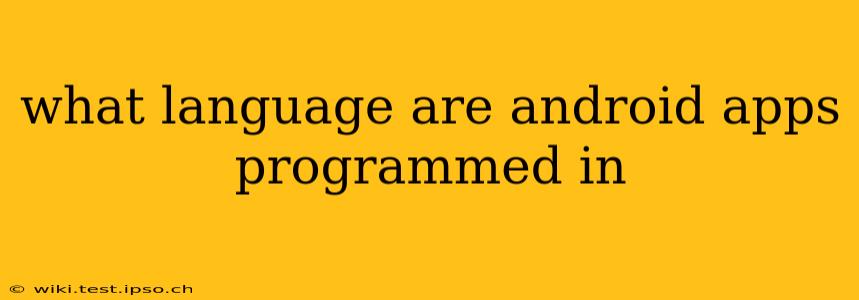What Language Are Android Apps Programmed In?
Android app development is a dynamic field, and the answer to this question isn't a simple single language. While Kotlin is now the preferred language, and Java remains a significant player, several other languages and tools contribute to the diverse ecosystem of Android app creation. Let's explore the key languages and their roles.
What is the most popular language for Android app development?
Currently, Kotlin holds the title of the most popular language for Android app development. Google officially supports it, and its concise syntax, enhanced safety features, and interoperability with Java make it a compelling choice for developers. Many new Android apps are built primarily using Kotlin, and existing Java projects often incorporate Kotlin components.
Is Java still used for Android development?
Yes, Java remains a significant language in Android development. Although Kotlin's popularity is rising, a vast amount of existing Android codebases are written in Java. Developers familiar with Java will find it relatively easy to transition to Kotlin, and many projects continue using Java, especially those with extensive legacy code. Therefore, understanding Java remains important, even with Kotlin's prominence.
What other languages are used for Android app development?
While Kotlin and Java dominate, other languages find niches in Android development:
- C++: Used for performance-critical components, especially in game development or situations demanding low-level access to system resources. This isn't for the entire app, but for specific parts.
- C# with Xamarin: Microsoft's Xamarin framework allows for cross-platform development using C#. While not as prevalent as Kotlin or Java, it offers an alternative for developers already proficient in C#.
- Dart with Flutter: Flutter, a cross-platform framework from Google, uses Dart as its primary language. Flutter is gaining traction, especially for apps aiming for both Android and iOS deployment with a shared codebase. While not strictly "Android-only," it's a significant player in the mobile app development space impacting Android significantly.
- React Native (JavaScript): Although not directly compiling to native Android code, React Native allows developers to build Android apps using JavaScript. This is another cross-platform option, offering faster development cycles but potentially sacrificing some performance compared to native approaches.
Which language should I learn for Android development?
For beginners entering Android development in 2024, Kotlin is the clear recommendation. It's officially supported by Google, enjoys widespread adoption, and offers a more modern and efficient approach to development compared to Java. However, understanding the basics of Java can still be beneficial, given its legacy presence in Android development.
Can I use multiple languages in one Android app?
Yes, it's entirely possible and often beneficial to use multiple languages within a single Android application. For example, you might use Kotlin for most of the app's logic, but incorporate a C++ library for a computationally intensive task. The flexibility allows developers to leverage the strengths of different languages to optimize performance and maintainability.
What is the best language for Android game development?
For Android game development, C++ is often the preferred choice due to its performance capabilities. While other languages like Kotlin and Java can be used for simpler games, high-performance games frequently rely on C++ to handle complex graphics and physics calculations efficiently. Game engines like Unity (often using C#) also play a significant role, but even within Unity, C++ can be integrated for optimized performance.
In conclusion, while Kotlin is the current leading language for Android app development, the ecosystem remains diverse. The best language for your project will depend on factors like existing skills, project requirements (performance needs, complexity), and the availability of libraries and tools.
